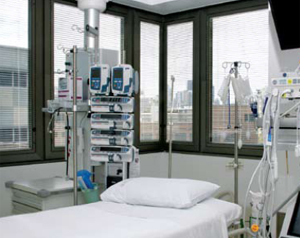Intensive Care Unit
Information for relatives and friends of intensive care patients
The intensive care unit (ICU) is a specialised ward that cares for patients who are very ill or need special care and observation. Specially trained medical and nursing staff provide the intensive care that these patients require. We acknowledge that you are concerned for your family member. If you have any questions, please do not hesitate to ask the nursing staff.

Enquiries regarding a patient’s condition
We recommend, and prefer, that one family member/friend be nominated to liaise with ICU staff regarding the patient’s condition. This person can then relay the information to other family members and friends to ensure that everyone has the correct information. This helps limit the number of telephone calls the nurse at the bedside receives and allows them more time to deliver care to your family member/friend. Significant changes in a patient’s condition will be communicated to the nominated next of kin.
A useful website for information about patients and relatives who have experienced critical illness is: http://www.healthtalkonline.org/Intensive_care/
Visiting
- Visiting hours in ICU are flexible; however, due to space and privacy restrictions, a maximum of two visitors per patient are permitted in the unit at any one time. If you wish to discuss your family member/friend’s care with the medical staff please ask the bedside nurse to arrange this.
- We are constantly attending to patient’s needs; therefore, there may be times when visitors will be asked to wait outside to facilitate patient care or procedures.
- We also ask that mobile phones are placed in ‘silent’ mode or switched off during your visit to minimise noise in the unit.
The role of relatives and friends
Rest is an essential part of a patient’s recovery so visiting is restricted to people the patient considers to be immediate family. Children may visit at any time, if appropriate, after discussion with clinical staff.
As family and friends of an ICU patient, the best thing you can do is be there, provide support and let them know you care. It is okay to touch a patient, hold their hand and talk to them—although they may not be able to respond, they can usually hear and feel you.
Gifts
Unfortunately flowers and large gifts such as stuffed toys and balloons are not permitted in ICU as they take up valuable space and can interfere with equipment. If you would like to give a gift, please limit it to greeting cards or photos.
Infection prevention and control
Please clean your hands with alcohol gel when entering and leaving ICU to help reduce the risk of infection in the unit.
Equipment
All patients in ICU are connected to a monitor located above the bed. This monitor displays the patient’s vital signs (e.g. heart rate) and these are observed and recorded by the nurse at the bedside. Other special items of equipment may be in use and can be explained on request.
Personal belongings
Only essential items are required for patients in intensive care. These include:
- sleep wear
- toiletries
- personal items e.g. glasses; hearing aids
- any usual medications—please give these to the nursing staff for safe storage.
We strongly recommend that patients do not keep any valuables while in ICU e.g. wallets and jewellery.
Waiting rooms in ICU
These rooms are available for your use and we encourage you to take short breaks away from the unit and ensure you get sufficient rest. Mobile phones can be used in the waiting room as long as they are placed in silent mode or switched off
before entering the ICU.
Social Work
If you require a social worker to assist please ask the nursing staff and they will organise an appointment. A social worker is available to assist with:
- counseling and support for patients, families and friends
- practical assistance e.g. Centrelink benefits, accommodation and assistance schemes for country relatives, emergency childcare.
Pastoral Care
A pastoral care worker is available for patients, families and friends. Pastoral carers offer:
- support in crisis—time to listen
- emotional and spiritual support and care (including pastoral counselling)
- help in grief and loss
- prayer and/or sacraments as the patient or family wishes.
This service may be accessed through the nursing staff, or telephone 07 3163 8111 and ask for Pastoral Care.
Chapel
Chapels are located on Level 6, Mater Private Hospital Brisbane and Level 3, Salmon Building.
Parking
- There are three multi-storey car parks on the South Brisbane campus—Hancock Street Car Park, Mater Hill Car Park and Mater Medical Centre Car Park. These car parks are open 24 hours a day, seven days a week.
- All proceeds from Mater’s car parks support Mater patient care and medical research.
- For further details including maps and parking fees, refer to Mater’s website for general parking information.
Research and quality activities
Occasionally medical and nursing research projects are conducted in ICU and you may be approached to provide permission for you or your family member/friend to be included in a research project or provide feedback about the patient experience.
Contact details
Intensive Care Unit
Level 5, Salmon Building
Mater Health Services
Raymond Terrace, South Brisbane Q 4101
Phone 07 3163 8111
www.mater.org.au
© 2018 Mater Misericordiae Ltd. ACN 096 708 922.
Mater acknowledges consumer consultation in the development of this patient information.
Mater Doc Num: PI-CLN-420023
Last modified 01/3/2018.
Consumers were consulted in the development of this patient information.
Last consumer engagement date: 20/12/2017
For further translated health information, you can visit healthtranslations.vic.gov.au/ supported by the Victorian Department of Health and Human Services that offers a range of patient information in multiple languages.